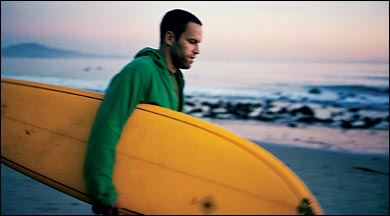How best to describe Jack Johnson? Surfer? Filmmaker? Multi-platinum rock star? How about the luckiest friggin’ guy on the planet? Raised on Oahu’s fabled North Shore, Johnson, 29, began competing in pro surfing events in 1992, at age 17. He quit to study filmmaking at UC Santa Barbara, and his first film, 1999’s Thicker Than Water, became an instant surf classic. He scored the movie himself, and bootleg tapes of his folksy grooves became the de rigueur soundtrack for beach parties everywhere. His first studio album, Brushfire Fairytales, came out two years later on an indie label and sold 75,000 copies on word of mouth, then went platinum after Universal Records rereleased it. His 2003 follow-up, On and On, has so far sold 1.6 million copies. With In Between Dreams, out March 1, Johnson delivers more of his signature good-times acoustic strumming—and a hefty chunk of change for the environment. Already the founder of the Kokua Hawaii Foundation, an environmental education program for schoolkids, Johnson has joined the One Percent for the Planet program, dedicating at least that much of his income to green groups. From his North Shore home, Johnson spoke with ���ϳԹ��� about the aloha spirit, eco-awareness, and his unapologetically upbeat tunes.
���ϳԹ���: How strange is it for a kid from the North Shore to become a pop star?
Johnson: Growing up here, the surf world is everything. We lived on the beach, right in front of Pipeline. When the waves got gigantic, the crashing would rumble our windows at night. All I ever dreamed of was being a pro surfer. That’s all any kid who grows up here wants to be. I never thought about music being more than a hobby that we’d do at night or when the waves weren’t good.
So playing tunes was all about chilling out?
There was definitely that reggae/aloha/island style growing up here. It wasn’t like L.A., where you could go see all these fancy shows. The music I got turned on to was by friends of my dad’s who could play guitar or ukulele. They would sit around playing Marley or Cat Stevens or the Beatles. I didn’t learn guitar so I could get up on the stage; I wanted to lead the sing-alongs on the front porch.
Sounds like that classic Hawaiian aloha spirit.
The aloha spirit is strong, and it’s not just some tourist marketing shit. It’s true: There’s a really warm feeling you get from the Polynesian people.
But the North Shore has a dark side, too.
There’s sort of a Wild West aspect to the North Shore that doesn’t let it turn into too glossy and perfect a place. Fights happen and people take matters into their own hands. I’m not saying I’m glad about that, but at the same time it keeps it from being just a vacation spot. You’ve got to be a little street-smart to pull it off around here.
Then why no angst or edge in your music?
Listen to Jamaican music. Cuban. Hawaiian. Afrobeat. Most of the sound from these areas is uplifting—it just makes you feel good. I’d feel funny writing a song that had a lot of angst in it, because that’s not my personality. Even if it’s a cynical song, my main goal is to make you feel better when you hear it. All the tones we try to get are easy on the ears. I like edgy music—it’s just not what comes out of me.
How is In Between Dreams different from your first two albums?
I have no idea. I’ll be the first to say—and I don’t think this is a negative thing—but all my records sound pretty similar. I’m not into reinventing myself.
Why join the One Percent for the Planet program?
It’s a revolution, in a way: Just take 1 percent of this money you’re making and put it into something that’s important. But I try not to come off preachy about it. You just put the One Percent label on the back of the CD and people can learn about it if they want to. I’m sure some people will interpret that as preachy. You can’t ever win with these things.
Do you consider yourself an environmentalist?
I grew up in the ocean, so the environment has always been important to me. I joined the Surfrider Foundation as a teenager and went to meetings. But I’ve never really thought of myself as an environmentalist—and still don’t. That’s a big label. I’m just the one playing music and drawing a crowd.
You tour with your wife and one-year-old son. When do you get to party like a rock star?
The party is the show itself. Once it’s over, it’s back to the family. My friends joke with me: “Yeah, real smart, Jack. Get married and then become a star.” I’d been with my wife for a long time before this all started, so I never really got to have my rock-star party period. But that’s all right.
What about downtime? Where do you go on vacation?
When I have time off, I want to be home. It always freaks me out—usually the first day I get back—how nice it is here. You get home and the air is so humid, it feels like a blanket. And if the waves are six feet and glassy and perfect, that helps, too.
Swell Guy

(Photo: Anthony Mandler)
New perk: Easily find new routes and hidden gems, upcoming running events, and more near you. Your weekly Local Running Newsletter has everything you need to lace up! .
From ���ϳԹ��� Magazine, Mar 2005
Lead Photo: Anthony Mandler

